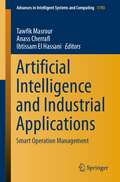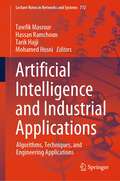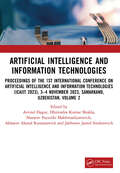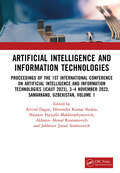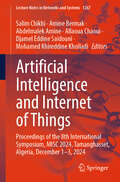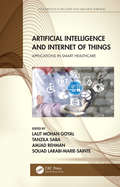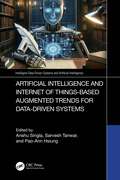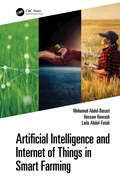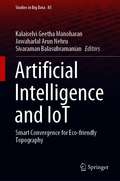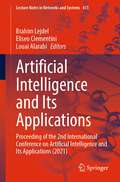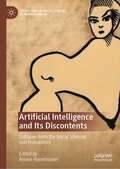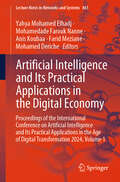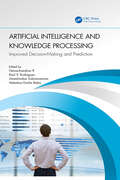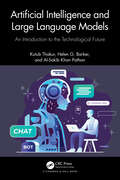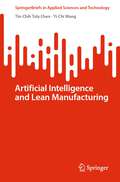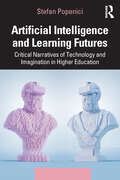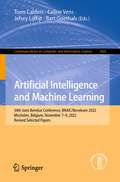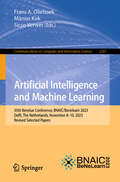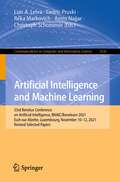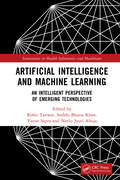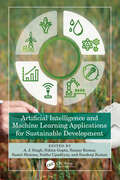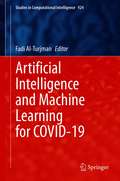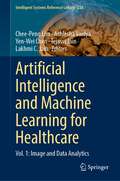- Table View
- List View
Artificial Intelligence and Industrial Applications: Smart Operation Management (Advances in Intelligent Systems and Computing #1193)
by Tawfik Masrour Ibtissam El Hassani Anass CherrafiThis book gathers the refereed proceedings of the Artificial Intelligence and Industrial Applications (A2IA’2020), the first installment of an annual international conference organized by the ENSAM-Meknes at Moulay Ismail University, Morocco. The 30 papers presented here were carefully reviewed and selected from 141 submissions by an international scientific committee. They address various aspects of artificial intelligence such as smart manufacturing, smart maintenance, smart supply chain management, supervised learning, unsupervised learning, reinforcement learning, graph-based and semi-supervised learning, neural networks, deep learning, planning and optimization, and other AI applications. The book is intended for AI experts, offering them a valuable overview of the status quo and a global outlook for the future, with many new and innovative ideas and recent important developments in AI applications, both of a foundational and practical nature. It will also appeal to non-experts who are curious about this timely and important subject.
Artificial Intelligence and Industrial Applications: Algorithms, Techniques, and Engineering Applications (Lecture Notes in Networks and Systems #772)
by Tawfik Masrour Hassan Ramchoun Tarik Hajji Mohamed HosniAmid the dynamic growth of artificial intelligence, this book presents a collection of findings and advancements from the second edition of the A2IA-Artificial Intelligence and Industrial Applications conference. The conference, hosted by ENSAM-Meknès at Moulay Ismail University, Morocco, fosters knowledge exchange in AI, focusing primarily on its industrial applications. Covering a wide range of topics, the book highlights the adaptable nature of AI and its increasing impact on industrial sectors. It brings together contributions from an international cohort of researchers, discussing themes such as intelligent manufacturing and maintenance, intelligent supply chain management, various modes of learning including supervised, unsupervised, reinforcement, semi-supervised, and graph-based, as well as neural networks, deep learning, planning, and optimization. A defining feature of this edition is its extensive scope and emphasis on the practical applications of AI, along with its foundational elements. It facilitates an understanding of AI's current state and potential future direction, showcasing recent developments that bridge the gap between theory and practice. Designed for a diverse readership, this book is of interest to AI practitioners, academics, and enthusiasts, as well as to those new to the field. It provides an opportunity to explore AI's critical role in industrial applications, and the practical insights it offers are likely to be beneficial for decision-making within industrial settings.
Artificial Intelligence and Information Technologies: Proceedings of the 1st International Conference on Artificial Intelligence and Information Technologies (ICAIIT 2023), 3–4 November 2023, Samarkand, Uzbekistan, Volume 2
by Arvind Dagur Dhirendra Kumar Shukla Nazarov Fayzullo Makhmadiyarovich Akhatov Akmal Rustamovich Jabborov Jamol SindorovichThis book contains the proceedings of a non-profit conference with the objective of providing a platform for academicians, researchers, scholars and students from various institutions, universities and industries in India and abroad, and exchanging their research and innovative ideas in the field of Artificial Intelligence and Information Technologies.It begins with exploring the research and innovation in the field of Artificial Intelligence and Information Technologies including secure transaction, monitoring, real time assistance and security for advanced stage learners, researchers and academicians has been presented. It goes on to cover: Broad knowledge and research trends about artificial intelligence and Information Technologies and their role in today’s digital era. Depiction of system model and architecture for clear picture of AI in real life. Discussion on the role of Artificial Intelligence in various real-life problems such as banking, healthcare, navigation, communication, security, etc. Explanation of the challenges and opportunities in AI based Healthcare, education, banking, and related Industries. Recent Information technologies and challenges in this new epoch. This book will be beneficial to researchers, academicians, undergraduate students, postgraduate students, research scholars, professionals, technologists and entrepreneurs.
Artificial Intelligence and Information Technologies: Proceedings of the 1st International Conference on Artificial Intelligence and Information Technologies (ICAIIT 2023), 3–4 November 2023, Samarkand, Uzbekistan, Volume 1
by Arvind Dagur Dhirendra Kumar Shukla Nazarov Fayzullo Makhmadiyarovich Akhatov Akmal Rustamovich Jabborov Jamol SindorovichThis book contains the proceedings of a non-profit conference with the objective of providing a platform for academicians, researchers, scholars and students from various institutions, universities and industries in India and abroad, and exchanging their research and innovative ideas in the field of Artificial Intelligence and Information Technologies.It begins with exploring the research and innovation in the field of Artificial Intelligence and Information Technologies including secure transaction, monitoring, real time assistance and security for advanced stage learners, researchers and academicians has been presented. It goes on to cover: Broad knowledge and research trends about artificial intelligence and Information Technologies and their role in today’s digital era. Depiction of system model and architecture for clear picture of AI in real life. Discussion on the role of Artificial Intelligence in various real-life problems such as banking, healthcare, navigation, communication, security, etc. Explanation of the challenges and opportunities in AI based Healthcare, education, banking, and related Industries. Recent Information technologies and challenges in this new epoch. This book will be beneficial to researchers, academicians, undergraduate students, postgraduate students, research scholars, professionals, technologists and entrepreneurs.
Artificial Intelligence and Internet of Things: Proceedings of the 8th International Symposium, MISC 2024, Tamanghasset, Algeria, December 1-3, 2024 (Lecture Notes in Networks and Systems #1267)
by Salim Chikhi Amine Bermak Abdelmalek Amine Allaoua Chaoui Djamel Eddine Saidouni Mohamed Khireddine KholladiThis book offers a cutting-edge exploration of key advancements in artificial intelligence, IoT, data science, and their transformative impact on industries, particularly health care, in a rapidly evolving technological landscape. Readers will discover how AI and machine learning drive innovations, from detecting anomalies in satellite systems to enhancing medical diagnostics and treatment precision. With a focus on real-world applications, the book delves into the integration of IoT systems and cloud computing to streamline business operations and improve efficiency. It also introduces groundbreaking data science techniques for analysis and prediction, making it a valuable resource for professionals, researchers, and students. Designed for those looking to understand and harness the power of modern technology, this book provides insights that are both practical and forward-looking, equipping readers to address today’s challenges and shape the future.
Artificial Intelligence and Internet of Things: Applications in Smart Healthcare (Innovations in Big Data and Machine Learning)
by Lalit Mohan GoyalThis book reveals the applications of AI and IoT in smart healthcare and medical systems. It provides core principles, algorithms, protocols, emerging trends, security problems, and the latest e-healthcare services findings.The book also provides case studies and discusses how AI and IoT applications such as wireless devices, sensors, and deep learning could play a major role in assisting patients, doctors, and pharmaceutical staff. It focuses on how to use AI and IoT to keep patients safe and healthy and, at the same time, empower physicians to deliver superlative care.This book is written for researchers and practitioners working in the information technology, computer science, and medical equipment manufacturing industry for products and services having basic- and high-level AI and IoT applications. The book is also a useful guide for academic researchers and students.
Artificial Intelligence and Internet of Things based Augmented Trends for Data Driven Systems (Intelligent Data-Driven Systems and Artificial Intelligence)
by Pao-Ann Hsiung Sarvesh Tanwar Anshu SinglaThis book comprehensively discusses the role of cloud computing in artificial intelligence‑based data‑driven systems and hybrid cloud computing for large data‑driven applications. It further explores new approaches, paradigms, and frameworks to meet societal challenges by providing solutions for critical insights into data. The text provides Internet of Things‑based frameworks and advanced computing techniques to deal with online/virtual systems.This book:• Covers the aspects of security, authentication, and prediction for data‑driven systems in heterogeneous environments.• Provides data‑driven frameworks in combination with the Internet of Things, artificial intelligence, and computing to provide critical insights and decision‑making for real‑time problems.• Showcases deep learning‑based computer vision algorithms for enhanced pattern detection in different domains based on data‑centric approaches.• Examines the role of the Internet of Things and machine learning algorithms for data‑driven systems.• Highlights the applications of data‑driven systems and cloud computing in enhancing network performance.This book is primarily written for senior undergraduates, graduate students, and academic researchers in diverse fields including electrical engineering, electronics and communications engineering, and computer science engineering.
Artificial Intelligence and Internet of Things in Smart Farming
by Mohamed Abdel-Basset Hossam Hawash Laila Abdel-FatahThis book provides a broad overview of the areas of artificial intelligence (AI) that can be used for smart farming applications, through either successful engineering or ground-breaking research. Among them, the highlighted tactics are soil management, water management, crop management, livestock management, harvesting, and the integration of Internet of Things (IoT) in smart farming.Artificial Intelligence and Internet of Things in Smart Farming explores different types of smart framing systems for achieving sustainability goals in the real environment. The authors discuss the benefits of smart harvesting systems over traditional harvesting methods, including decreased labor requirements, increased crop yields, increased probabilities of successful harvests, enhanced visibility into crop health, and lower overall harvest and production costs. It explains and describes big data in terms of its potential five dimensions—volume, velocity, variety, veracity, and valuation—within the framework of smart farming. The authors also discuss the recent IoT technologies, such as fifth-generation networks, blockchain, and digital twining, to improve the sustainability and productivity of smart farming systems. The book identifies numerous issues that call for conceptual innovation and has the potential to progress machine learning (ML), resulting in significant impacts. As an illustration, the authors point out how smart farming offers an intriguing field for interpretable ML. The book then delves into the function of AI techniques, such as AI in accelerating the development of nano-enabled agriculture, thereby facilitating safe-by-design nanomaterials for various consumer products and medical applications.This book is for undergraduate students, graduate students, researchers, and AI engineers who pursue a strong understanding of the practical methods of machine learning in the agriculture domain. Practitioners and stakeholders would be able to follow this book to understand the potential of ML in their farming projects and agricultural solutions.Features:• Explores different types of smart framing systems for achieving sustainability goals in the real environment • Explores ML-based analytics such as generative adversarial networks (GAN), autoencoders, computational imaging, and quantum computing • Examines the development of intelligent machines to provide solutions to real-world problems, emphasizing smart farming applications, which are not modeled or are extremely difficult to model mathematically • Emphasizes methods for better managing crops, soils, water, and livestock, urging investors and businesspeople to occupy the existing vacant market area • Discusses AI-empowered Nanotechnology for smart farming
Artificial Intelligence and IoT: Smart Convergence for Eco-friendly Topography (Studies in Big Data #85)
by Kalaiselvi Geetha Manoharan Jawaharlal Arun Nehru Sivaraman BalasubramanianThis book projects a futuristic scenario that is more existent than they have been at any time earlier. To be conscious of the bursting prospective of IoT, it has to be amalgamated with AI technologies. Predictive and advanced analysis can be made based on the data collected, discovered and analyzed. To achieve all these compatibility, complexity, legal and ethical issues arise due to automation of connected components and gadgets of widespread companies across the globe. While these are a few examples of issues, the authors’ intention in editing this book is to offer concepts of integrating AI with IoT in a precise and clear manner to the research community. In editing this book, the authors’ attempt is to provide novel advances and applications to address the challenge of continually discovering patterns for IoT by covering various aspects of implementing AI techniques to make IoT solutions smarter. The only way to remain pace with this data generated by the IoT and acquire the concealed acquaintance it encloses is to employ AI as the eventual catalyst for IoT. IoT together with AI is more than an inclination or existence; it will develop into a paradigm. It helps those researchers who have an interest in this field to keep insight into different concepts and their importance for applications in real life. This has been done to make the edited book more flexible and to stimulate further interest in topics. All these motivated the authors toward integrating AI in achieving smarter IoT. The authors believe that their effort can make this collection interesting and highly attract the student pursuing pre-research, research and even master in multidisciplinary domain.
Artificial Intelligence and Its Applications: Proceeding of the 2nd International Conference on Artificial Intelligence and Its Applications (2021) (Lecture Notes in Networks and Systems #413)
by Brahim Lejdel Eliseo Clementini Louai AlarabiThis book contains the proceedings of the second edition of the international Conference on Artificial Intelligence and its Applications (AIAP'21). This edition aims to bring together leading academic scientists, international researchers, and practitioners to exchange and share their experiences and research results on all aspects of Artificial Intelligence. It also provides an interdisciplinary platform for researchers, practitioners and students to present and discuss the most recent innovations, trends, and concerns as well as practical challenges encountered and solutions adopted in the fields of Artificial Intelligence. This international conference offers an opportunity to bridge the gap between the Artificial Intelligence research community and people from the industry or working in other research areas including smart cities, big data, cloud computing, social networks, and energy.
Artificial Intelligence and Its Contexts: Security, Business and Governance (Advanced Sciences and Technologies for Security Applications)
by Anna Visvizi Marek BodzianyThis book offers a comprehensive approach to the question of how artificial intelligence (AI) impacts politics, economy, and the society today. In this view, it is quintessential for understanding the complex nature of AI and its role in today’s world. The book has been divided into three parts. Part one is devoted to the question of how AI will be used for security and defense purposes, including combat in war zones. Part two looks at the value added of AI and machine learning for decision-making in the fields of politics and business. Part three consists of case studies—covering the EU, the USA, Saudi Arabia, Portugal, and Poland—that discuss how AI is being used in the realms of politics, security and defense. The discussion in the book opens with the question of the nature of AI, as well as of ethics and the use of AI in combat. Subsequently, the argument covers issues as diverse as the militarization of AI, the use of AI in strategic studies and military strategy design. These topics are followed by an insight into AI and strategic communication (StratCom), including disinformation, as well as into AI and finance. The case-studies included in part 3 of the book offer a captivating overview of how AI is being employed to stimulate growth and development, to promote data- and evidence-driven policy-making, to enable efficient and inclusive digital transformation and other related issues. Written by academics and practitioners in an academically sound, yet approachable manner, this volume queries issues and topics that form the thrust of processes that transform world politics, economics and society. As such, this volume will serve as the primer for students, researchers, lectures and other professionals who seek to understand and engage with the variety of issues AI implicates.
Artificial Intelligence and Its Discontents: Critiques from the Social Sciences and Humanities (Social and Cultural Studies of Robots and AI)
by Ariane HanemaayerOn what basis can we challenge Artificial Intelligence (AI) - its infusion, investment, and implementation across the globe? This book answers this question by drawing on a range of critical approaches from the social sciences and humanities, including posthumanism, ethics and human values, surveillance studies, Black feminism, and other strategies for social and political resistance. The authors analyse timely topics, including bias and language processing, responsibility and machine learning, COVID-19 and AI in health technologies, bio-AI and nanotechnology, digital ethics, AI and the gig economy, representations of AI in literature and culture, and many more. This book is for those who are currently working in the field of AI critique and disruption as well as in AI development and programming. It is also for those who want to learn more about how to doubt, question, challenge, reject, reform and otherwise reprise AI as it been practiced and promoted.
Artificial Intelligence and Its Practical Applications in the Digital Economy: Proceedings of the International Conference on Artificial Intelligence and Its Practical Applications in the Age of Digital Transformation 2024, Volume 1 (Lecture Notes in Networks and Systems #861)
by Yahya Mohamed Elhadj Mohamedade Farouk Nanne Anis Koubaa Farid Meziane Mohamed DericheArtificial Intelligence (AI) technologies hold immense promise for developing countries by offering innovative solutions to longstanding challenges. By leveraging AI in health care, education, economic development, infrastructure, and resource management, these countries can potentially leapfrog traditional development stages and improve the quality of life for their populations. However, it's essential to approach AI deployment with ethical considerations to ensure that the technology serves the best interests of these communities and thus to maximize the expected benefits. The I2COMSAPP'24 "International Conference on Artificial Intelligence and its Applications in the Age of Digital Transformation" aims to provide an excellent opportunity to gather experts, researchers, practitioners, and innovators from various fields to explore the latest advancements, challenges, and practical implementations of artificial intelligence and machine learning (ML) technologies. Moreover, it aims to foster knowledge sharing, collaboration, and networking among professionals who are driving responsible and innovative use of AI and leveraging real-world applications for the betterment of society and industries.
Artificial Intelligence and Its Practical Applications in the Digital Economy: Proceedings of the International Conference on Artificial Intelligence and its Practical Applications in the Age of Digital Transformation 2024, Volume 2 (Lecture Notes in Networks and Systems #862)
by Yahya Mohamed Elhadj Mohamedade Farouk Nanne Anis Koubaa Farid Meziane Mohamed DericheArtificial Intelligence (AI) technologies hold immense promise for developing countries by offering innovative solutions to longstanding challenges. By leveraging AI in health care, education, economic development, infrastructure, and resource management, these countries can potentially leapfrog traditional development stages and improve the quality of life for their populations. However, it's essential to approach AI deployment with ethical considerations to ensure that the technology serves the best interests of these communities and thus to maximize the expected benefits. The I2COMSAPP'24 "International Conference on Artificial Intelligence and its Applications in the Age of Digital Transformation" aims to provide an excellent opportunity to gather experts, researchers, practitioners, and innovators from various fields to explore the latest advancements, challenges, and practical implementations of artificial intelligence and machine learning (ML) technologies. Moreover, it aims to foster knowledge sharing, collaboration, and networking among professionals who are driving responsible and innovative use of AI and leveraging real-world applications for the betterment of society and industries.
Artificial Intelligence and Knowledge Processing: Improved Decision-Making and Prediction
by Hemachandran K Raul V. Rodriguez Umashankar Subramaniam Valentina Emilia BalasArtificial Intelligence and Knowledge Processing play a vital role in various automation industries and their functioning in converting traditional industries to AI-based factories. This book acts as a guide and blends the basics of Artificial Intelligence in various domains, which include Machine Learning, Deep Learning, Artificial Neural Networks, and Expert Systems, and extends their application in all sectors. Artificial Intelligence and Knowledge Processing: Improved Decision-Making and Prediction, discusses the designing of new AI algorithms used to convert general applications to AI-based applications. It highlights different Machine Learning and Deep Learning models for various applications used in healthcare and wellness, agriculture, and automobiles. The book offers an overview of the rapidly growing and developing field of AI applications, along with Knowledge of Engineering, and Business Analytics. Real-time case studies are included across several different fields such as Image Processing, Text Mining, Healthcare, Finance, Digital Marketing, and HR Analytics. The book also introduces a statistical background and probabilistic framework to enhance the understanding of continuous distributions. Topics such as Ensemble Models, Deep Learning Models, Artificial Neural Networks, Expert Systems, and Decision-Based Systems round out the offerings of this book. This multi-contributed book is a valuable source for researchers, academics, technologists, industrialists, practitioners, and all those who wish to explore the applications of AI, Knowledge Processing, Deep Learning, and Machine Learning.
Artificial Intelligence and Large Language Models: An Introduction to the Technological Future
by Al-Sakib Khan Pathan Kutub Thakur Helen G. BarkerHaving been catapulted into public discourse in the last few years, this book serves as an in-depth exploration of the ever-evolving domain of artificial intelligence (AI), large language models, and ChatGPT. It provides a meticulous and thorough analysis of AI, ChatGPT technology, and their prospective trajectories given the current trend, in addition to tracing the significant advancements that have materialized over time.Key Features: Discusses the fundamentals of AI for general readers Introduces readers to the ChatGPT chatbot and how it works Covers natural language processing (NLP), the foundational building block of ChatGPT Introduces readers to the deep learning transformer architecture Covers the fundamentals of ChatGPT training for practitioners Illustrated and organized in an accessible manner, this textbook contains particular appeal to students and course convenors at the undergraduate and graduate level, as well as a reference source for general readers.
Artificial Intelligence and Lean Manufacturing (SpringerBriefs in Applied Sciences and Technology)
by Tin-Chih Toly Chen Yi-Chi WangThis book applies artificial intelligence to lean production and shows how to practically combine the advantages of these two disciplines. Lean manufacturing originated in Japan and is a well-known tool for improving manufacturers' competitiveness. Prevalent tools for lean manufacturing include Kanban, Pacemaker, Value Stream Map, 5s, Just-in-Time and Pull Manufacturing. Lean Manufacturing and the Toyota Manufacturing System has been successfully applied to various factories and supply chains around the world. A lean manufacturing system can not only reduce wastes and inventory, but also respond to customer needs more immediately. Artificial intelligence is a subject that has attracted much attention recently. Many researchers and practical developers are working hard to apply artificial intelligence to our daily lives, including in factories. For example, fuzzy rules have been established to optimize machine settings. Bionic algorithms have been proposed to solve production sequencing and scheduling problems. Machine learning technologies are applied to detect possible product quality problems and diagnose the health of a machine. This book will be of interest to production engineers, managers, as well as students and researchers in manufacturing engineering.
Artificial Intelligence and Learning Futures: Critical Narratives of Technology and Imagination in Higher Education
by Stefan PopeniciArtificial Intelligence and Learning Futures: Critical Narratives of Technology and Imagination in Higher Education explores the implications of artificial intelligence’s adoption in higher education and the challenges to building sustainable instead of dystopic schooling. As AI becomes integral to both pedagogy and profitability in today’s colleges and universities, a critical discourse on these systems and algorithms is urgently needed to push back against their potential to enable surveillance, control, and oppression. This book examines the development, risks, and opportunities inherent to AI in education and curriculum design, the problematic ideological assumptions of intelligence and technology, and the evidence base and ethical imagination required to responsibly implement these learning technologies in a way that ensures quality and sustainability. Leaders, administrators, and faculty as well as technologists and designers will find these provocative and accessible ideas profoundly applicable to their research, decision-making, and concerns.
Artificial Intelligence and Machine Learning: 34th Joint Benelux Conference, BNAIC/Benelearn 2022, Mechelen, Belgium, November 7–9, 2022, Revised Selected Papers (Communications in Computer and Information Science #1805)
by Toon Calders Celine Vens Jefrey Lijffijt Bart GoethalsThis book contains a selection of the best papers of the 34th Benelux Conference on Artificial Intelligence, BNAIC/ BENELEARN 2022, held in Mechelen, Belgium, in November 2022.The 11 papers presented in this volume were carefully reviewed and selected from 134 regular submissions. They address various aspects of artificial intelligence such as natural language processing, agent technology, game theory, problem solving, machine learning, human-agent interaction, AI and education, and data analysis.
Artificial Intelligence and Machine Learning: 35th Benelux Conference, BNAIC/Benelearn 2023, Delft, The Netherlands, November 8–10, 2023, Revised Selected Papers (Communications in Computer and Information Science #2187)
by Frans A. Oliehoek Manon Kok Sicco VerwerThis book constitutes the refereed proceedings of the 35th Benelux Conference on Artificial Intelligence and Machine Learning, BNAIC/Benelearn 2023, held in Delft, The Netherlands, during November 8–10, 2023. The 14 papers included in these proceedings were carefully reviewed and selected from 47 submissions. These papers focus on various aspects of Artificial Intelligence and Machine learning, including Natural Language Processing and Reinforcement Learning, and their applications.
Artificial Intelligence and Machine Learning: 33rd Benelux Conference on Artificial Intelligence, BNAIC/Benelearn 2021, Esch-sur-Alzette, Luxembourg, November 10–12, 2021, Revised Selected Papers (Communications in Computer and Information Science #1530)
by Cédric Pruski Amro Najjar Luis A. Leiva Réka Markovich Christoph SchommerThis book contains a selection of the best papers of the 33rd Benelux Conference on Artificial Intelligence, BNAIC/ BENELEARN 2021, held in Esch-sur-Alzette, Luxembourg, in November 2021. The 14 papers presented in this volume were carefully reviewed and selected from 46 regular submissions. They address various aspects of artificial intelligence such as natural language processing, agent technology, game theory, problem solving, machine learning, human-agent interaction, AI and education, and data analysis.
Artificial Intelligence and Machine Learning: An Intelligent Perspective of Emerging Technologies (Innovations in Health Informatics and Healthcare)
by Rohit Tanwar Surbhi Bhatia Khan Varun Sapra Neelu Jyoti AhujaThis book focuses on artificial intelligence (AI) and machine learning (ML) technologies and how they are progressively being incorporated into a wide range of products, including consumer gadgets, "smart" personal assistants, cutting-edge medical diagnostic systems, and quantum computing systems. This concise reference book offers a broad overview of the most important trends and discusses how these trends and technologies are being created and employed in the applications in which they are being used. Artificial Intelligence and Machine Learning: An Intelligent Perspective of Emerging Technologies offers a broad package involving the incubation of AI and ML with various emerging technologies such as Internet of Things (IoT), healthcare, smart cities, robotics, and more. The book discusses various data collection and data transformation techniques and also maps the legal and ethical issues of data-driven e-healthcare systems while covering possible ways to resolve them. The book explores different techniques on how AI can be used to create better virtual reality experiences and deals with the techniques and possible ways to merge the power of AI and IoT to create smart home appliances. With contributions from experts in the field, this reference book is useful to healthcare professionals, researchers, and students of industrial engineering, systems engineering, biomedical, computer science, electronics, and communications engineering.
Artificial Intelligence and Machine Learning Applications for Sustainable Development
by A. J. Singh, Nikita Gupta, Sanjay Kumar, Sumit Sharma, Subho Upadhyay, and Sandeep KumarThe book highlights how technologies including artificial intelligence and machine learning are transforming renewable energy technologies and enabling the development of new solutions. It further discusses how smart technologies are employed to optimize energy production and storage, enhance energy efficiency, and improve the overall sustainability of energy systems.This book: Discusses artificial intelligence-based techniques, namely, neural networks, fuzzy expert systems, optimization techniques, and operational research Showcases the importance of artificial intelligence and machine learning in the energy market, demand analysis, and forecasting of renewable energy applications Illustrates strategies for sustainable development using artificial intelligence and machine learning applications Presents applications of artificial intelligence in the domain of electronics transformation and development, smart cities, and renewable energy utilization Highlights the role of artificial intelligence in solving problems such as image and signal processing, smart weather monitoring, smart farming, and distributed energy sources It is primarily written for senior undergraduates, graduate students, and academic researchers in diverse fields, including electrical, electronics and communications, energy, and environmental engineering.
Artificial Intelligence and Machine Learning for COVID-19 (Studies in Computational Intelligence #924)
by Fadi Al-TurjmanThis book is dedicated to addressing the major challenges in fighting COVID-19 using artificial intelligence (AI) and machine learning (ML) – from cost and complexity to availability and accuracy. The aim of this book is to focus on both the design and implementation of AI-based approaches in proposed COVID-19 solutions that are enabled and supported by sensor networks, cloud computing, and 5G and beyond. This book presents research that contributes to the application of ML techniques to the problem of computer communication-assisted diagnosis of COVID-19 and similar diseases. The authors present the latest theoretical developments, real-world applications, and future perspectives on this topic. This book brings together a broad multidisciplinary community, aiming to integrate ideas, theories, models, and techniques from across different disciplines on intelligent solutions/systems, and to inform how cognitive systems in Next Generation Networks (NGN) should be designed, developed, and evaluated while exchanging and processing critical health information. Targeted readers are from varying disciplines who are interested in implementing the smart planet/environments vision via wireless/wired enabling technologies.
Artificial Intelligence and Machine Learning for Healthcare: Vol. 1: Image and Data Analytics (Intelligent Systems Reference Library #228)
by Chee-Peng Lim Ashlesha Vaidya Yen-Wei Chen Tejasvi Jain Lakhmi C. JainArtificial intelligence (AI) and machine learning (ML) have transformed many standard and conventional methods in undertaking health and well-being issues of humans. AL/ML-based systems and tools play a critical role in this digital and big data era to address a variety of medical and healthcare problems, improving treatments and quality of care for patients. This edition on AI and ML for healthcare consists of two volumes. The first presents selected AI and ML studies on medical imaging and healthcare data analytics, while the second unveils emerging methodologies and trends in AI and ML for delivering better medical treatments and healthcare services in the future.In this first volume, progresses in AI and ML technologies for medical image, video, and signal processing as well as health information and data analytics are presented. These selected studies offer readers theoretical and practical knowledge and ideas pertaining to recent advances in AI and ML for effective and efficient image and data analytics, leading to state-of-the-art AI and ML technologies for advancing the healthcare sector.
